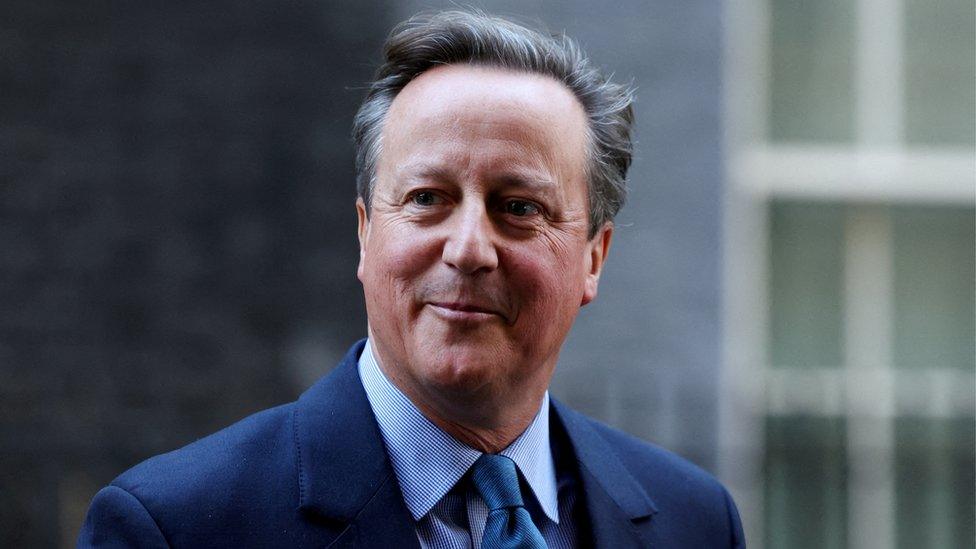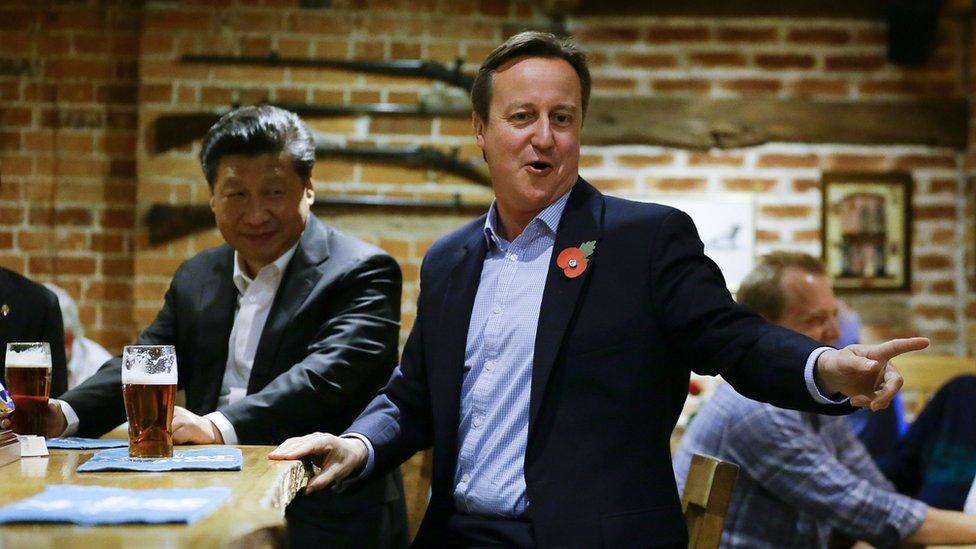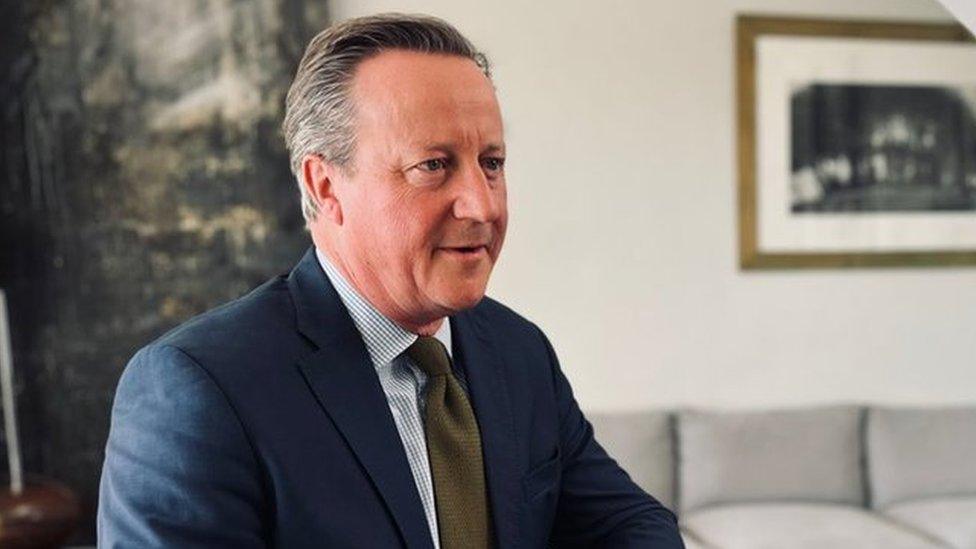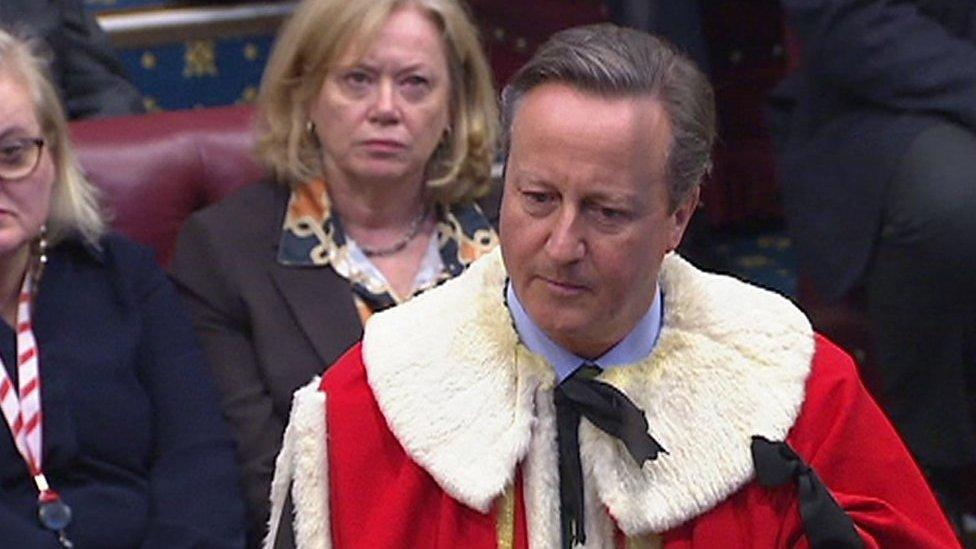Lord Cameron says UK must engage with China
- Published

David Cameron says his six years as prime minister "was a good apprenticeship" for being foreign secretary
Lord Cameron has defended his pro-China policy as prime minister, insisting that it is still right to "engage" with Beijing.
In his first full interview since becoming foreign secretary, Lord Cameron said China is key to solving big issues like climate change.
The comments risk angering Tory MPs, some of whom China has sanctioned.
But he told the BBC he supported the government's current "realistic, hard-headed policy" towards China.
In a wide-ranging conversation, Lord Cameron also denied he had become foreign secretary because he was bored.
"Being prime minister for six years was a good apprenticeship for being foreign secretary," he said.
Lord Cameron has been criticised for his close involvement with Chinese investment in recent years.
He has given speeches praising a port development in Sri Lanka owned ultimately by a Chinese state company.
He tried to set up a £1bn China-Investment fund. And he met senior Chinese figures on visits to Beijing.
This has raised fears among some MPs that Lord Cameron could seek to soften the government's attitude towards China.
'Wolf warrior diplomacy'
But he told the BBC the world had changed since he was prime minister.
"China has become much more aggressive, much more assertive, over the Uighurs, over Hong Kong, the 'wolf warrior' diplomacy," he said.
"And so that's why security and protection is such an important part of our policy.
"We also need to align more carefully with our allies to make sure we can counter any malign threats coming from China. So, it is a realistic hard headed policy."
But he defended his previous policy in Downing Street that sought a new "golden era" in Sino-UK relations.
He said: "When I became prime minister, the greatest need was for Britain to grow again, trade again, with exports to help our businesses around the world.
"I loaded up planes, I took them to India, I took them to China, I took them to Africa to get the economy moving again."
And the government, he said, should still deal with Beijing today.
"Engaging China is one part of the approach we need to take," he said.
"Not least, because China is a fifth of humanity. We're not going to solve challenges like climate change, unless we engage.
"And hopefully I can be a part of that."

David Cameron took Chinese President Xi Jinping to a pub near Chequers as part of his push for a 2golden era" of Chinese relations.
Lord Cameron also risked angering pro-Brexit Tory MPs by saying Britain should engage more closely with the European Union on foreign, defence and security policy.
He said Britain had decided not to be a member of the EU but had to be "a friend, a neighbour and the best possible partner" and the UK had to make that work.
"When you look at the engagement in Ukraine, that probably is the best example of how it's worked," he said.
"There's no doubt that Britain is the leading European power in helping Ukraine.
"I heard that over and over again from the president downwards. But we're doing that in partnership with our European colleagues.
"So, I think we can make friend, neighbour and partner work. And I'm determined to do so."
Supporting Sunak
Even in his first few days back in office, Lord Cameron has been a strong advocate for boosting Britain's international development policy.
But he suggested he would not push for a return to the target of spending 0.7% of national income on foreign aid.
"I took this job accepting collective Cabinet responsibility," he said.
Lord Cameron gave his "100% support" to the government's Rwanda migration policy, saying "we have to do what it takes to break the model of the people smugglers".
He said: "What I'm absolutely ready to do is to support the government's policy and 100% because we have got to stop the boats.
"And I don't say this glibly. I know that there's nothing more destructive to a country's immigration system and immigration policy than large scale, very visible illegal migration.
"And that is what we have. That's what we got to stop.
"Now the number of small boat crossings is down by a third. But we have to do whatever it takes to break the model of the people's workers."
Asked if he was willing to countenance pulling Britain out of the European Convention on Human Rights, he ignored the question and said: "I'm very happy to say I 100% support the government policy and whatever it takes."
Related topics
- Published24 November 2023

- Published20 November 2023
